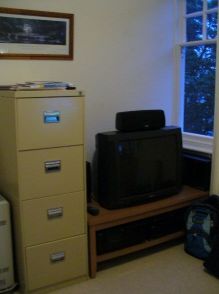
Last October the UK began progressively switching from analogue to digital television. For the next four years, more than one thousand transmitters nationwide will be switched to digital. London will be one of the last areas to change in late 2012. The USA is also in the midst of a similar switch over. Its last analogue signal is currently scheduled to be switched off on February 18 next year.
The first UK town to switch was Whitehaven, Cumbria. Almost 25,000 households began receiving digital transmissions in October 2007 before its analogue signal went dark on November 14. The town, famous for the nearby Sellafield nuclear plant (the world's first commercial nuclear power station), was chosen for its relative electromagnetic isolation. This made it an ideal location to test digital transmission without interference from other transmitters.
Ofcom, the nation’s communications regulator, says at least 84% of British households have already installed digital equipment. These households have digital television sets, or digital signal converter attached to their old analogue television. Signal convertor boxes cost as little as £20, and give consumers access to more than 40 free digital TV channels using a service called Freeview.
While there’s no need to dispose of your old television, retailers say many people are taking the opportunity to upgrade. Currently, a new digital-ready, 42-inch LCD TV costs less than £800. It makes me weep to think that our 42-inch Plasma TV cost £2400 four years ago. In fact, some retailers no longer sell analogue televisions. Last January, Currys, the nation’s largest consumer electrical retailer announced that its remaining analogue TV stock was its last.
Earlier today Garry and I carted a large, "old" CRT TV set to the dump. We aren't using it and couldn’t see any reason to hold on to an incredibly heavy, dated chunk of technology. Local councils expect millions more to join our junked TV over the next few years. Some are recycled as exports to developing nations, while most become landfill. In the USA, the Environmental Protection Agency (EPA) estimates that 18% of sets were recycled in 2007. I wonder where our TV will end up?




No comments:
Post a Comment